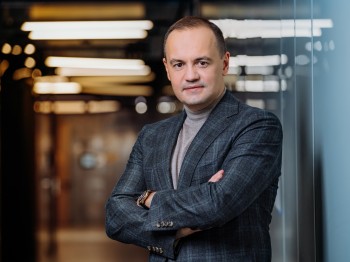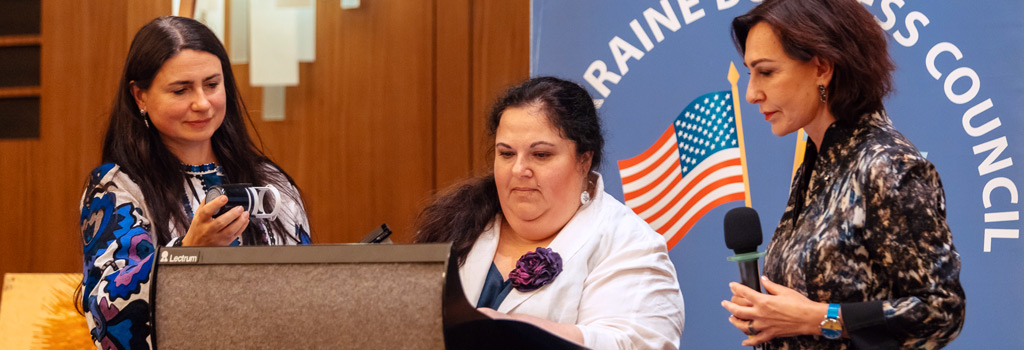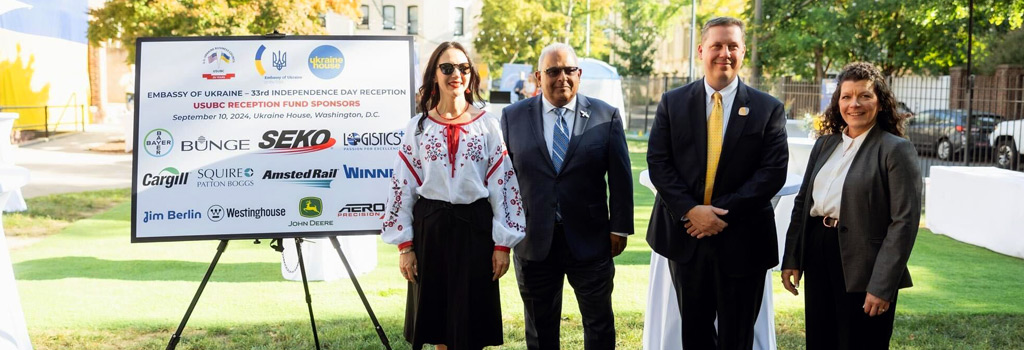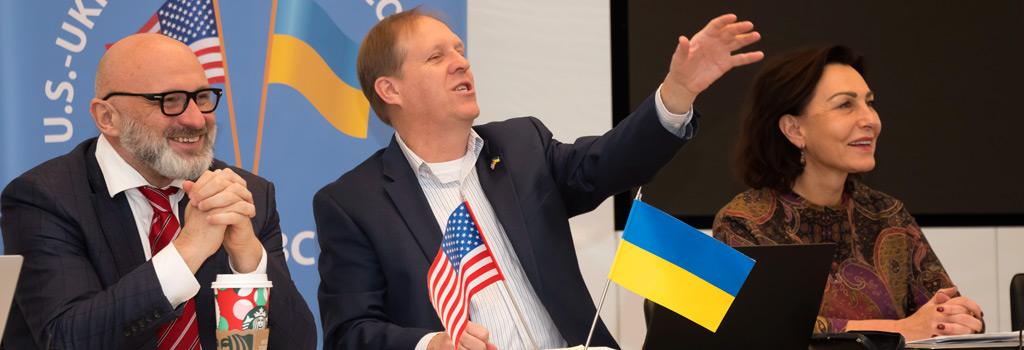Featured Galleries USUBC COLLECTION OF OVER 160 UKRAINE HISTORIC NEWS PHOTOGRAPHS 1918-1997
 Holodomor Posters
Holodomor Posters

Davos Agenda: conclusions for Ukraine
.png) DTEK, Kyiv, Ukraine, Feb 03, Wed, 2020
DTEK, Kyiv, Ukraine, Feb 03, Wed, 2020
DTEK is a member of U.S.-Ukraine Business Council
 Recovery after the COVID-19 pandemic was the main theme of Davos Agenda 2021. French Minister of the Economy, Finance and Recovery Bruno Le Maire said the EU could take lessons from the US on how to support corporations in times of crisis, and conversely the US from the EU on how to support people.
Recovery after the COVID-19 pandemic was the main theme of Davos Agenda 2021. French Minister of the Economy, Finance and Recovery Bruno Le Maire said the EU could take lessons from the US on how to support corporations in times of crisis, and conversely the US from the EU on how to support people.
In Ukraine, we need to learn to do both, in order to leverage opportunities which will arise from a post-pandemic economic and social reset. We must restore trust in each other and be responsible in the implementation of joint agreements and consistent in the manner in which we achieve our goals.
This year’s event reflected the times and took place online, which made the Forum more open, less mysterious and distant from the public, giving everyone the opportunity to hear firsthand the key ideas and thoughts on the future development of the world. This openness was a product of rapid digitilisation, which has been significantly accelerated by the pandemic. In fact, this change deserves further attention in order to scale it to a level for doing business and public administration.
Openness, in turn, is a foundation for building a dialogue between consumers, business and the state. It is restoration of trust as the first step towards overcoming the crisis and building a better future, the founder and executive chairman of the World Economic Forum, Klaus Schwab, articulated in his opening speech.
The high level of distrust is one of the worst legacies of post-communist countries that we have yet to address. However, by trusting our partners, we can work together to achieve greater success for all parties. Therefore, social trust between citizens is a prerequisite for forming an ability to cooperate successfully — and the crisis of the COVID-19 pandemic makes it possible to create this new fundamental value. We have witnessed how Ukrainian business is able to launch joint initiatives with the state in the fight against the pandemic. It is important to understand and apply this experience in other areas, and not only in times of crisis, in order to build a sustainable future for Ukraine.
Trust is essential to enacting the recovery and transformation of the global economy, solving climate problems and achieving carbon neutrality. Vaccine nationalism, for example, will only serve as an impediment to overcoming the pandemic, while a policy of isolationism will only exacerbate economic challenges stemming from the pandemic. Additionally, it is impossible to address global environmental issues at the local level, as carbon emissions don’t respect borders. We need to restore global cooperation.
This issue is especially important for Ukraine. We made our choice to follow the European path of development. But this requires us to build trusting relationships with our partners, both at the international governmental and business levels. For Ukraine, this means continuing and deepening structural reforms. This process is not easy and requires cooperation and shared confidence between all stakeholders. In 2019, we began to implement the reform of the electricity market, which is still going through a painful stage of formation, but its success should yield positive outcomes for all market participants — above all, consumers.
Completing reforms is the fulfillment of commitments. Renouncing them is not just a "step back", but a threat to the credibility of Ukraine vis-à-vis its international partners, as well as barrier to the provision of a better future for tomorrow’s generations. Only through consistent actions and the fulfillment of public commitments can Ukraine make significant progress in overcoming the crisis and building a sustainable development economy. Government and business must look to the future together and predict what the economy will look like to properly invest. New technologies are bringing solutions to climate-related problems, as the green agenda grows in prominence across industries in the automotive and energy sectors.
2021 will be a turning point in the philosophy of global business. There will be a movement from shareholder capitalism to the capitalism of all stakeholders. If before capital was understood as a financial resource, it is now increasingly defined by both human resources and natural assets. This year, the WEF proposed a set of universal environmental, social and governance (ESG) indicators that companies can report on, regardless of their industry or region. Sustainability is already becoming the main driver of market value for business. ESG criteria are becoming progressively important in business reporting, even more so than information about financial results.
In order to restore the economy, global and local ties between business, investors, communities and governments, it is necessary to revive constructive dialogues. DTEK continues to contribute to the development of Ukraine’s economy through investments in modern, environmentally friendly technologies and innovations. However, alone, neither business nor the state are currently able to respond to all the challenges posed during the post-COVID era. A reset, followed by sustainable development, will only be possible if there is open dialogue between all parties, and the energy sector can become a driver of growth for the entire economy of Ukraine.
Maxim Timchenko, DTEK CEO

















